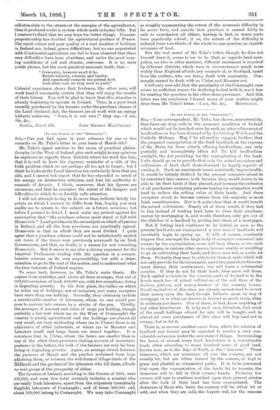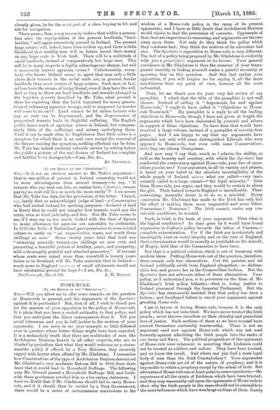LTO THE EDITOR OF THE " SPECTATOR. " ] SIR, — Your correspondent, Mr.
Take, has shown, unanswerably, that there are deep evils in the economic condition of Ireland which would not be touched even by such an utter effacement of landlordism as has been demanded by Archbishop Walsh and the Catholic Bishops. May I be allowed to suggest, further, that the proposed expropriation of the Irish landlords at the expense of the State, far from utterly effacing landlordism, can only partially and incompletely efface it ? To kill landlordism outright, the Act providing for the expropriation of the land- lords should go on to provide that only the actual occupiers and cultivators of land shall thenceforward be legally capable of owning it. Such an enactment seems manifestly impracticable. It would be bitterly disliked by the present occupiers about to be converted into owners, both because they would desire to be able to let their lands if they pleased, and because the exclusion of all purchasers excepting persons buying for occupation would tend to reduce the selling value of their lands. And these occupiers about to become owners form the majority-in most Irish constituencies, Nor is it quite clear that it would benefit the actual cultivators. Nearly all of them would, if they had to buy instead of renting land, have to raise their purohase- money by mortgaging it, and would, therefore, only get out of the clutches of a landlord by getting into those of a mortgagee.
But if letting land continues to be lawful, as soon as the present landlords are expropriated a new race of landlords will inevitably begin to spring up. It will, of course, constantly happen that amongst the large body of occupiers converted into owners by the expropriation, some will from illness, or the wish to emigrate, or various other causes, become unable or unwilling to go on cultivating their lands, and these men will, as a rule, let them. Probably they may be able to let them at rents which will not only provide for the terminable annuities payable to Govern- ment during their continuance, but will leave a substantial. surplus. If they do not let their lands, they must sell them. Such capital as exists in the country parts of Ireland is in the hands much less of actual cultivators of the soil, than of the traders, jobbers, and money-lenders of the country towns. Small capitalists of this class are already accustomed to invest their money upon the land, though hitherto more by way of mortgage, or in what are known in Ireland as profit rents, than in ordinary purchases. Few of them, in fact. know anything.of any other investment. It is by such men, therefore, that most of the small holdings offered for sale will be bought, and in almost all cases purchasers of this class will buy land not to occupy, but to let it.
There is, moreover, another cause from which the relation of landlord and tenant may be expected to receive a very con- siderable extension under the new state of things. Surrounding the house of almost every Irish landowner is a considerable tract, often extending to many hundred acres of good land, known now, as in the days of Swift, as the "demesne." These demesnes, which are numerous all over the conntry, are not usually let, but are either farmed by the owners, or kept in grass and planted as ornamental parks. It is to be presumed that upon the expropriation of the lands let to tenants, the demesnes will be left in their owners' hands. Probably few owners will care to continue resident upon their present estates after the bulk of their land has been expropriated. The demesnes of those who leave the country will be either let or sold, and when they are sold, the buyers will, for the reasons
already given, be for the most part of a class buying to let, and not for occupation. There seems, then, every reason to believe that within a genera- tion after the expropriation of the present landlords, "land- lordism" will again extensively prevail in Ireland. The present large estates will, indeed, have been broken up, and there is little likelihood that wealthy men will in future invest their money on any large scale in Irish land. There will be a multitude of small landlords, instead of comparatively few large ones. This will be in many respects a highly advantageous change, but will it necessarily repress agrarian crime P Unfortunately, every- body who knows Ireland seems to agree that men only a little above their tenants in the social scale are, in general, harder landlords than most owners of large estates. Such men, in fact, seldom have the means of being liberal, even if they have the will. And as long as there are hard landlords and tenants plunged in the hopeless poverty described by Mr. Tuke, what ground is there for expecting that the habit ingrained for many genera- tions of redressing agrarian wrongs, real or supposed, by murder will come to an end ? Land cannot be let unless tenants who pay no rent can be dispossessed, and the dispossession of pauperised tenants leads to frightful suffering. The English public bears much of agrarian crimes in Ireland, but compara- tively little of the sufferings and misery underlying them. Until it can be made clear to Englishmen that Irish crime is a symptom for which there is no real cure except the removal of the disease causing the symptom, nothing effectual can be done. Mr. Tuke has indeed rendered valuable service by setting before the public a picture of the real disease of Ireland too complete and faithful to be disregarded.—I am, Sir, ecc.,
AN IRISHMAN.







































 Previous page
Previous page